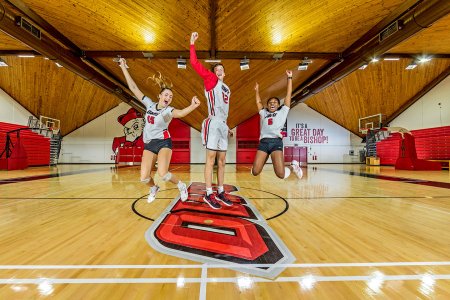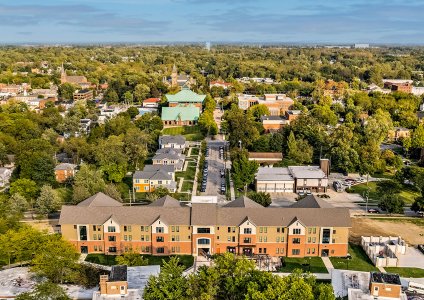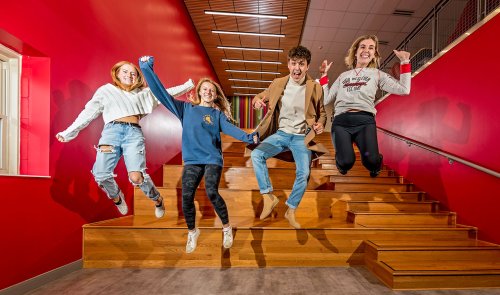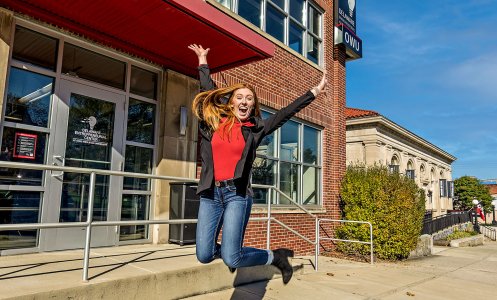Leaping Into the Future
OWU’s Connect Today, Create Tomorrow campaign shattered giving records, transformed the campus, and is opening life-changing opportunities for students.

If you haven’t visited Ohio Wesleyan in a few years, prepare to be astounded. Thanks to the overwhelming success of the recently concluded Connect Today, Create Tomorrow campaign, the beloved and historic OWU campus has been refurbished, renovated, and updated for a new generation of students—and alumni—to enjoy.
The transformation on campus is beautiful, and it extends beyond the physical aspects. Scholarships and financial aid, experiential learning through The OWU Connection, faculty development and recruitment, and the overall learning environment all benefit from the tremendous generosity of OWU’s alumni and friends, which raised nearly $238 million, shattering the original campaign goal of $200 million.
“We know that philanthropy is the difference-maker for American higher education, particularly for small colleges like Ohio Wesleyan,” says President Rock Jones. He says each donation is both a measure of gratitude to OWU and a measure of confidence in the institution and its future.
Jones believes the money raised—the most ever in any OWU campaign—ensures the university’s longevity. “The institutions that will thrive in the future will be those that benefit from philanthropy,” he says.
The campaign’s impact is also immediate and has enhanced the OWU experience of students throughout the seven-year campaign that began in 2014. “Donors make gifts because they want to create opportunity, and the opportunity is created when the money is put to work,” Jones says. “When we receive gifts, we want them to be put to work immediately.”
Justice Clark ’24, a zoology major from Oklahoma City, didn’t have to wait to benefit from the campaign. He credits his scholarship support for helping him make his success a reality. “During my time as a Dicke Scholar, I have been given the opportunity to meet community trailblazers from diverse areas, including academia, entrepreneurs, and healthcare, who took the time to share their remarkable knowledge and insight,” he says. “Additionally, being a Dicke Scholar has allowed me to cast my net wide and possibly participate in OWU’s study abroad program in Tanzania, which I would have never envisioned doing before attending OWU.”
Connecting Today

Planning for the Connect Today, Create Tomorrow campaign began at a board of trustees retreat in February 2014, where priorities and a timeline were discussed. By May, the campaign goal of $200 million was set, and two months later, the quiet phase of the effort began.
“We had big aspirations, and we felt the best opportunity to meet those goals was over a period of seven years,” Jones says. “Some were concerned that the goal was too high. But we felt that the needs we identified, with the vision in place, would be fulfilled in the most robust way with a campaign of this magnitude.”
By the time the campaign had its public launch in October 2017, $139 million had been raised from donors, and the funds were already transforming the campus and student experience. The campaign goal was met in the fall of 2019, but with urging from campaign co-chairs, John and Kathie Bradford Milligan ’83, of the San Francisco Bay area, and Kevin McGinty ’70 and his wife Nancy, of Moreland Hills, Ohio, trustees decided to keep going to see how much more could be raised by the campaign’s planned conclusion.
In the final years of the campaign, Vice President of Advancement Natalie Milburn Doan ’03 and her team contended with the fundraising challenges presented by the COVID-19 pandemic.
“We were facing limited opportunities to travel and meet with potential donors,” Doan says. “But we never wanted to use the pandemic as a reason to not keep moving forward. I think the pandemic propelled advancement staff to excel in spite of the situation—we were determined. Our advancement staff quickly adjusted to more phone calls and the world of Zoom to meet with donors, and our donors very graciously pivoted as well. Together, we worked to keep the momentum and the impact going for OWU and for our students.”
“Natalie’s taken it to a whole new level,” says Kevin McGinty. “As co-chairs we do some work, but it’s really the staff who do the big, big lifting.”
John Milligan says even the pandemic could not stanch the loyalty and generosity of OWU alumni and friends. “We had a great breadth of donors, people coming from far and wide to donate. There were people’s passion projects and money flowing in from unexpected places.”
We know that philanthropy is the difference-maker for American higher education.
President, Ohio Wesleyan University
By the end of the campaign on June 30, 2021, nearly 20,000 people had donated to the campaign, including 6,896 new donors, of which 218 gave $50,000 or more. The Connect Today, Create Tomorrow campaign was celebrated during Homecoming & Family Weekend, October 1-2, which included the dedication of Bradford Milligan Hall, OWU’s new apartment-style residence hall; an all-campus celebration and campaign announcement on the JAYWalk; and many alumni events that had been on hold, including 50th reunions for the Classes of 1970 and 1971.
Nancy McGinty says it was rewarding to learn about all the successful OWU graduates and to see their generosity. “When you initiate a campaign it sends a message to everyone that we are on the cusp of something great,” she says. “At the end of the campaign, you’re at the moment when we make that greatness happen.”
The campaign’s impact is two-fold, Kevin McGinty says. “It reinvigorated our investor base to let them know we still have a very vibrant, forward-looking product to offer the next generation of students. And it showed we could reinvigorate our physical landscape, the campus itself, to provide a comfortable, safe environment.”
Renewing Campus

Campaign and university leaders were committed to transforming OWU’s physical campus.
The Milligans saw the need to update OWU’s residential campus when they began looking at colleges with their oldest child, Bradford Milligan ’15. “When we’d tour other campuses, the residential buildings were way above what was at Ohio Wesleyan,” remembers Kathie, who graduated from OWU with a speech communications major. “We were looking at it from the lens of students looking at colleges, and we knew that was making it harder for OWU to compete.”
John, who majored in chemistry, thought the physical conditions of OWU’s residential campus did not align with the rest of the OWU experience. “It was clear that OWU had a lot of needs,” says John, who has been on the OWU board since 2010 and is currently its chairman. John’s connections with OWU run deep. His great-grandparents met at OWU, and his grandfather, Robert L. Milligan ’22, was both a graduate and a board member.
The McGintys also saw the great need to refresh campus, particularly the residence halls. Kevin, who grew up in Cleveland and was a first-generation college student, didn’t care what the OWU residence halls were like when he was living there. “I was just so happy to not be sleeping in a room with my brothers,” he laughs. But as an OWU board member for 15 years, Kevin realized that small liberal arts colleges had to keep moving forward.
“If you can’t get kids to go to Ohio Wesleyan because of the dorm, then how are they going to find out you have a terrific school?” asks Kevin.
“These historic campuses need a lot of love, and OWU needed a lot of love,” says John.
As a result of the campaign, $61 million worth of love has, or will, be funneled into campus buildings. By 2019, transformations included—east of Sandusky Street—the renovation of Merrick Hall, Edwards Gymnasium, and Branch Rickey Arena as well as construction of Simpson Querrey Fitness Center and upgrades to the Luttinger Family Tennis Center. West of Sandusky, the campaign funded the creation of the Delaware Entrepreneurial Center, the construction of three small living duplexes (Sloan, Dicke, and Dittrick houses), Gillespie Honors House, and the Butler A. Jones House of Black Culture, as well as the renovation of the Phi Delta Theta House.
More upgrades followed in 2019 under the umbrella of the Residential Campus Renewal Plan, with projects to completely renovate Smith Hall to house all first-year students, with a dining hall and gym, and to construct Bradford Milligan Hall apartments for seniors. Both projects were completed in time for the beginning of fall semester this year. Lead donors for the Residential Renewal project included Kara Trott ’83; Richard Bohr ’43 and Georgette Brusak Bohr; Sharon and Rob Hickson ’78; Dan Glaser ’82; Marcella McDonnell Stevens P’18 and Gregory Stevens P’18; Kathy Boles ’71 and Alton Smith; and Vik Malhotra ’87.
Finally, iconic Slocum Hall, including the Slocum Reading Room, is now being renovated and restored, thanks to a gift from an anonymous donor, and will open in Fall 2022.
Bob Gitter, professor of economics, says, “The campus looks better than it has in my 45 years here.”
An OWU Experience for All

Gitter also is impressed with how the campaign is expanding scholarships. A total of $68.4 million was raised for financial aid, scholarships, and The OWU Connection, the university’s signature program of experiential learning embedded in a vibrant liberal arts curriculum.
“Our campus now is more diverse than it’s ever been in terms of race and culture and income levels,” Gitter says. “I have so many students who are first-generation college students, and the financial support is so important to them.”
One of those first-generation students, Brittani Stiltner ’23, from Tiffin, Ohio, has benefited from the campaign in numerous ways. The oldest of six, she says she never could have afforded OWU without the scholarships she was awarded. A triple major in Spanish, economics, and international studies, she’s an intern with the university’s Global Scholars Program (alumni donations pay for her stipend) and last spring participated in a two-day Career Trek in Cleveland through OWU’s Career Connection, provided by campaign support.
Connect Today, Create Tomorrow also has directly impacted Gram Dick ’22, a first-generation student from Bucyrus, Ohio, guided to OWU scholarships—and a major—by a faculty member.
“As I was taking my business classes, I was also taking geography classes to fill other areas I needed in my liberal arts education.” His professors helped him discover his true passion for geography.
“Ever since then, I have never been more interested in my work, and it has led me to seek further opportunities in this field,” he says. In 2021 he worked with Associate Professor Nathan Rowley on a project in the Summer Science Research Program, using drones to determine the potential benefits of installing solar panels on the roofs of OWU buildings.
The OWU Connection

A priority of the Connect Today, Create Tomorrow campaign was to bolster The OWU Connection, an innovative curricular program to help students connect academic theory with real-world practice in a global context. The increased support aligns with OWU’s goal to provide all students, regardless of their financial circumstances, with access to mentored research, internships, volunteer service, cross-cultural experiences, study abroad, and leadership development through The OWU Connection.
Megan Ellis ’05, executive director of Career Connection, a program to help connect students with internships and prepare for the job market, says campaign funding has allowed her office to encourage students as early as their first year to think about careers and career development. Career Connection has launched seven career communities this year, led by Career Catalysts, industry experts who develop programs, lead workshops, and prepare students to succeed. Additionally, Career Treks give students externship and shadowing opportunities which help them navigate the uncertainties of choosing a career.
“Career Trek made me feel a lot better about my college experience, because I met with alumni who talked about their careers and how they got there,” says Brittani Stiltner ’22. “Growing up as a first-generation college student, there was a lot of pressure to walk into college with a major and a job title in mind. But in talking with alumni, it was comforting to know I didn’t have to have everything planned out for me and could explore my options.”
Ellis says, “The campaign has made it possible to hire Career Catalysts and grow our internal team to expand our work with alumni and other professional connections.” Campaign funds also have supported training for faculty to help show students how the skills they are developing in the classroom translate into skills that employers are looking for.
Another campaign-funded initiative is internship grants through Career Connection, which give students who are unable to afford the costs associated with having an internship, the opportunity to apply for grants to cover some of their expenses.
Bulbul Bhati ’23, a computer science major from Delhi, India, interned at RxNXT and Rev1 Ventures thanks to grants offered through Career Connection. “Through these grants, I managed to stay on campus over the summer and go back and forth from my work location, which was in Columbus,” Bhati says.
Bhati, who is interested in a career in data science and machine learning, says her internships gave her new perspectives because she worked alongside teams from other fields such as marketing, finance, and business development. She also applied her academic learning to her internships and vice versa.

“Using the skills I learned in class to solve real-life problems helped me grasp the concepts better. Now, whatever I study in the classroom, I try to analyze it from a real-life perspective or try to think of ways the concept can be applied in real life.”
Rock Jones says supporting students in their OWU Connection experiences is an essential part of the university’s mission. “By providing the support for students to extend their education beyond the campus through research, travel, and internships, we’re helping prepare students for the future, and students are bringing practical experience back to the classroom,” he says. “I’ve had students tell me how transformational these opportunities are for them.”
Aliyah Owens, a 2021 international business graduate, says her OWU Connection travel experience to Jamaica was life-changing. She traveled to Jamaica with Daniela Black ’19 and Associate Professor of English Nancy Comorau to attend the Calabash Literary Festival and explore the intersection of literary production, reception, and distribution on its economic structure.
“The Theory-to-Practice trip to Jamaica was my first time out of the United States, so I had no idea what to expect,” Owens recalls. “When I got there, there was such beauty in being able to see myself as a Black person and my experiences reflected in a culture that was not my own, and that made the world feel smaller and friendlier. I really needed and appreciated that connection and its timing, because my time at OWU was my first experience being away from the Black communities I grew up in.”
“We are incredibly grateful for donors, because Theory-to-Practice grants generally fully fund the travel experience,” Comorau says. “I work to keep costs low, but a $1,500 to $2,000 trip is still out of reach for many of our students.”
“I can’t stress enough that without this grant I would never have been able to afford to travel at all,” Owens shares. “Growing up, my family rarely had money or time to travel.”
The trip affected the rest of her time at OWU.
“Aliyah’s experience is the liberal arts experience we hope for,” Comorau says. “The world is complex, and disciplines are lenses to help us see that. Travel experiences expose students to a lot and act as accelerators. One day in another country can be like weeks in the classroom.”
Thanks to the generosity of OWU alumni and friends, the OWU experience will be transforming lives and creating brighter tomorrows for new generations of OWU students.
Kathy Lynn Gray is a freelance writer from Columbus and is the mother of Emily Foster Whittaker ’08. Ericka Kurtz is director of university advancement communications.
See photos from 2021 Celebration Weekend
By Kathy Lynn Gray and Ericka Kurtz
